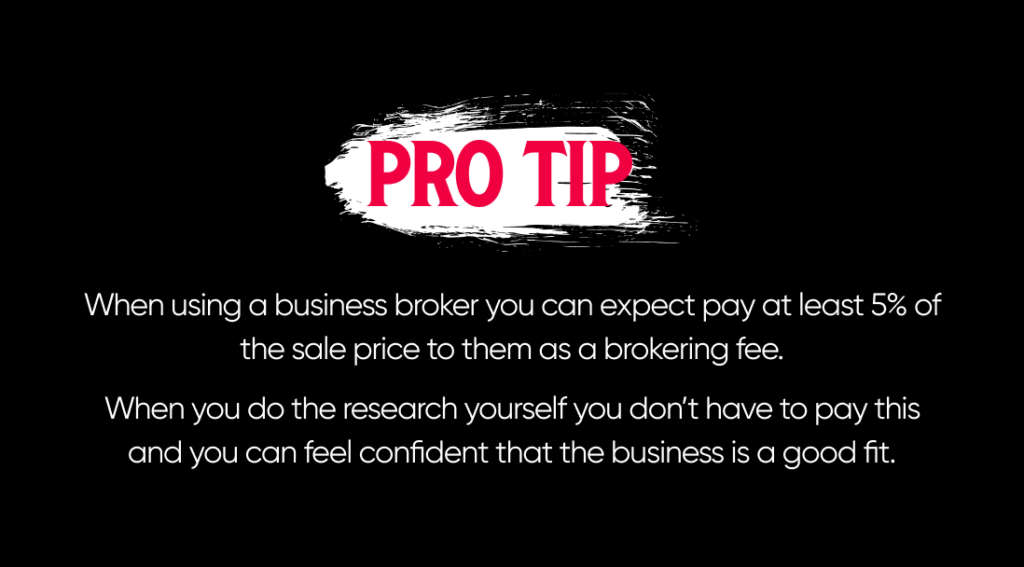
Around the world, 582 million entrepreneurs hand over the opportunity to work in a traditional job in exchange for the chance to be their own boss.
But it’s not always easy to start your own business, given that many of them fail. And the ones who succeed often have months or years ahead of them before becoming profitable.
Those years? Filled with challenges and potential setbacks to prove your worth and earn business from customers.
Some of the savviest entrepreneurs see a faster way.
They find existing businesses to buy. Then they optimize everything they can about the business.
There are plenty of ways to find the kind of businesses you want to buy, but it takes a dedicated process to succeed.
If you want to learn the best process (and the right places to look) for buying a business, you’ve found the right spot. Here’s what you need to know.
Pro Tip: Follow a Process to Find the Right Business
You need to know what type of business is the right fit for you first. Don’t start searching for something to buy until you’re clear on the different industries or models that appeal to you.
For example, maybe you don’t want to be a hands-on owner. Instead, you want to buy something where you can hire an operator to handle the day-to-day tasks.
You may look for something like a car wash or a laundromat to buy since most of the infrastructure would already exist in businesses like that.
Or maybe you want to take an outdated company and use your skills to bring it into the 21st century.
In that case, you might look for something where you can dive in and get your hands dirty.
Maybe you want to buy an RV park that doesn’t have enough modern amenities to draw in travelers or long-term visitors.
You might end up putting in a lot of upfront work to manage construction and fine-tune marketing. If that’s the part of the process you love the most, lean into that.
It’s overwhelming to look at all these businesses without some kind of context for what you’d enjoy and where there’s a good chance you’ll succeed. Always start with envisioning a few ideas for the types of businesses that appeal to you the most.
Let’s boil down the real work behind finding a business to buy.

You need to be a persistent searcher.
Your business won’t just fall in your lap. You need a strategic process if you plan on finding a great business purchase for you.
If you’re serious about owning a company that’s already got the goods in place to thrive, you have to put in the hours to find those opportunities.
Here’s the process we recommend you follow:
- Put a 20-60 minute search on your calendar every single day for 4 weeks. Be consistent with it and honor that appointment with yourself.
- Meet business owners in your community. Introduce yourself and get to know them. Mention that you’re always looking for businesses to acquire, then let the owners talk. They might ask for more details, be willing to sell to you, or know someone who might want to sell. Sometimes, the best business to buy is one that you already frequent (like a car wash, or a lawn care service).
- Comb through business broker websites with keywords and filters to help ensure you see everything that fits your needs. Create an Excel spreadsheet to track all the businesses you like and then reach out to those brokers.
- Find targeted centers of influence in your community, like the Chamber of Commerce, business development groups, business loan partners, and innovation centers. Connect at least every two weeks with someone new.
Now that you have a plan for how you’ll search, it’s time to consider all the places where you might score a great business find.
Search Online Business for Sale Marketplaces
We live in an age where you can do just about anything online. And that includes finding businesses listed for sale.
There are general websites with business for sale listings on the open market. But you can also find specialty websites that focus on specific business models or industries.
Some of the best marketplaces to check out include:
- BizBuySell: A general marketplace with all kinds of business listings broken down by things like industry, location, and whether or not they’ll take seller financing to do the deal.
- Flippa: a marketplace focused on online businesses with listings for everyone from active blogs and domains to e-commerce and more.
- LoopNet: which features companies that have a physical location for operations.
Once you find something that appeals to you, visit the business in person so you can dig in and determine if this is the gold nugget you think it is.
Work with a Business Broker

This is an option, but it’s not our favorite.
By partnering with a broker, you outsource some of the research to find a business you want to buy. In theory, it might make more sense to do this if you already own a lot of businesses and need someone to take on the research work for you.
But there’s a lot to gain from doing the research yourself so you can feel confident that everything on your shortlist is a pretty good fit.
Brokers can work for buyers or sellers, and in some cases where you use seller financing, you have to pay the broker’s fee. Expect to pay 5% if you get roped in to pay them.
Network in Your Community
One of the best ways to get a phone call or email every time there’s a business for sale in your region is to network.
This way, you get the opportunities delivered to you and may be the first to hear about something just coming on the market.
This is why it’s so important to visit local business owners and get to know them. Tell them you’re interested in becoming a business owner and may want to buy.
You never know who they know. They may also want to make their own exit from business ownership, too.
Local business organizations are another good place to connect. Check out your local chamber of commerce and business associations like BNI or Rotary.
If you can, find hyper-targeted centers of influence, like women’s entrepreneurship groups or your area’s Latino Chamber of Commerce.
Attend Conferences or Meetups for Entrepreneurs
If you already know your target industry, you’ll make your life way easier by heading to where those business owners hang out.
Attend expos, conferences, meetups, and workshops for those business owners to network and pass your name around.
You’ll also pick up some great tidbits or tools along the way that you can use once you own a company in this space.
Join Groups for Other Business Buyers
Coming together with a group of like-minded people who all want to know about great opportunities is inspiring.
Joining a group gives you a strong sounding board if you’re on the fence about businesses you’re looking at. Plus, there’s a ton of knowledge in these groups to give you insight before you make an offer.
And you can also find plenty of people passing opportunities to one another in mastermind groups.

It’s amazing to get support throughout the entire process of researching, negotiating, and transitioning into ownership. It’s one of our favorite things to watch our own Contrarian Community members go through this journey and cheer one another on!
Use BizScout to Find Off-Market Deals
Both as buyers of businesses and in helping other people acquire their own business ventures, we realized a need.
Sometimes, you can’t find something in an open marketplace, or your best efforts at networking turn up dry.
Good news: your hunt for the perfect business isn’t over yet since you can use a service we bought, BizScout, to find off-market deals.
Here’s what makes that a no-brainer: BizScout takes your personal preferences and spits out a list of off-market businesses that fit what you’re looking for in an acquisition.
You don’t need to waste hours hunting for the right company if you believe time is money, so feel free to start your research with BizScout.
Ready to Invest? Here’s What’s Next
Finding the right business is only the first step in a successful acquisition and transition to ownership. There’s way more to buying a business than just finding one.
You need to evaluate every business you want to buy to verify it’s the right fit for you. Rule out businesses with major red flags (AKA issues you can’t fix or ones that feel way too big to fix to make it worth it).
Once you evaluate a company for sale and decide it’s the right fit, you can make an offer, develop your transition plan, and take over ownership.




